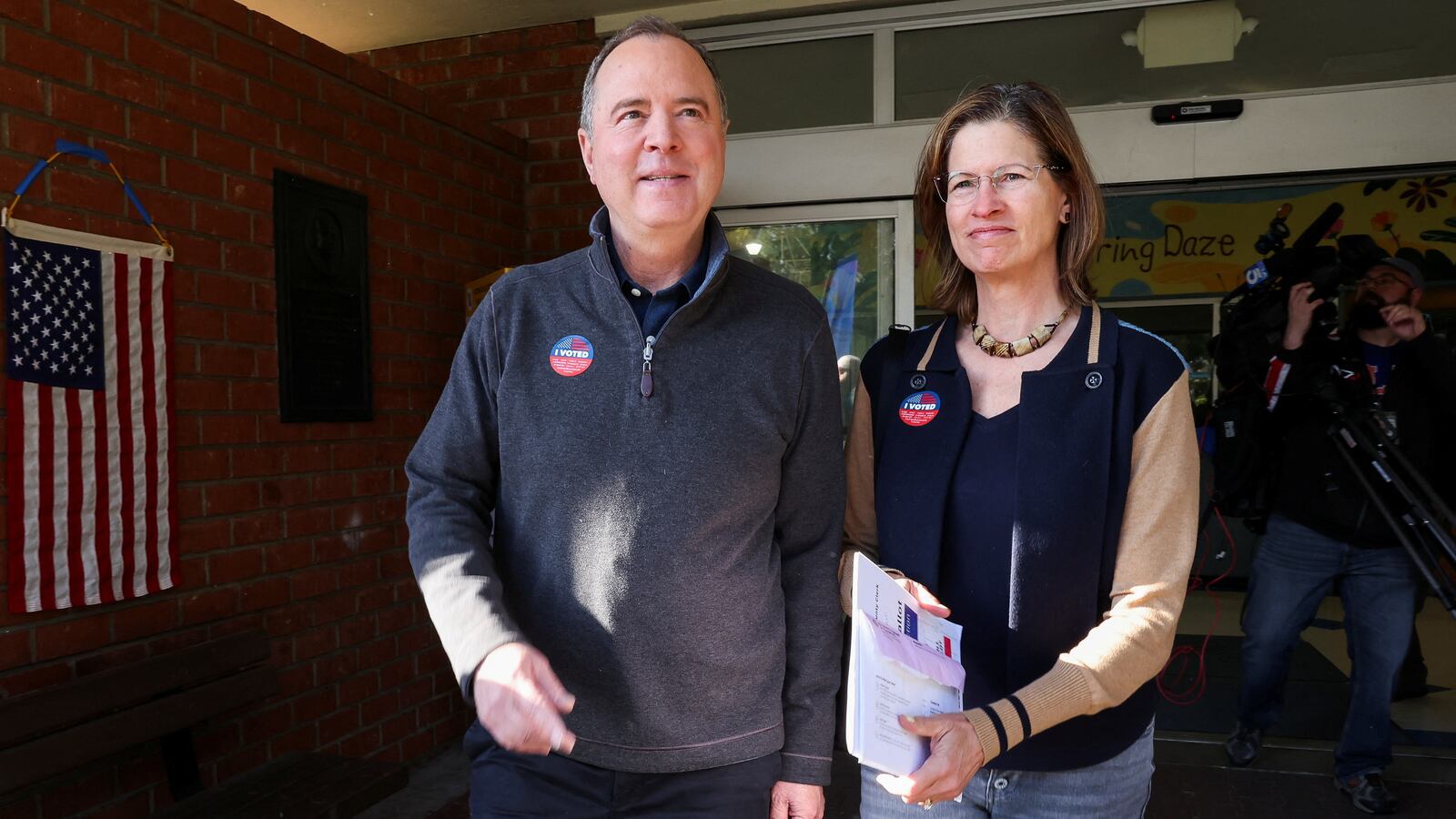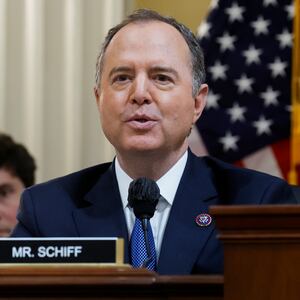The epic Democratic Party civil war brewing over California’s open U.S. Senate seat has officially fizzled into a coronation.
In Tuesday’s primary election, Rep. Adam Schiff (D-CA) and Republican baseball legend Steve Garvey earned the top two spots to advance to the November general election, boxing out Reps. Katie Porter (D-CA) and Barbara Lee (D-CA), who were on track to place third and fourth, respectively.
While California's vote-counting process will not be completed for days or even weeks, the early returns were strong enough for Schiff and Garvey that the Associated Press projected their top-two finishes an hour after polls closed in California.
Because of California’s deep blue tilt and its jungle primary system—in which the top two candidates proceed to the general election regardless of party—the conventional wisdom long held that Schiff and another Democrat would face off in November.
But Schiff, who had a massive campaign war chest at his disposal, spent heavily on TV ads boosting Garvey’s profile in hopes of drawing him as his general election opponent. The gambit worked, and Schiff is now all but guaranteed to win the Senate seat once held for decades by the late Dianne Feinstein.
After years of considering higher office, the longtime congressman and anti-Trump leader is on the cusp of a powerful and prestigious post that could be his for many years.
For Democrats who braced for a brutal intra-party battle that would’ve sucked away tens of millions of dollars and distracted party loyalists from other Senate contests, Schiff’s victory will come as a relief. Much of the Democratic establishment lined up for Schiff, including former Speaker Nancy Pelosi, whose early support gave him an immediate advantage.
Progressives, meanwhile, will be furious that they are locked out of the general election in a favorable state like California. While Schiff aligns himself with the party’s liberal wing now, he was perceived as to the right of Porter and Lee on key issues, and they made his past as a conservative Democrat part of their campaign attacks.
If the left had consolidated behind one candidate—either Porter or Lee—she very likely would have advanced to a one-on-one with Schiff. But neither Porter or Lee, each of whom has distinct brands and different appeals to parts of the party’s coalition, wanted to bow out.
Schiff was able to exploit that division by boosting Garvey just enough to edge out Porter. He spent millions of dollars on TV ads contrasting himself directly with Garvey and framing the election as a choice between the two of them—all while making sure to note that Garvey supports Donald Trump.
In a post on X, Porter fumed about what she called Schiff’s “brazenly cynical” ads, which she said were about “furthering his own political career, boxing out qualified Democratic women candidates, and boosting a Republican candidate to do it.”
For much of the year-plus long campaign, opinion polls showed Schiff and Porter were the clear top two, with Lee typically in a distant third place. After Garvey entered the race in December, however, early surveys showed him running evenly with Porter with around 15 percent of the vote—enough ammunition for Schiff to begin running the ads calling Garvey his main opponent.
Although Porter ended up spending her own money to boost another, more obscure GOP candidate in hopes of eating into Garvey’s vote share, Schiff’s maneuver clearly prevailed.
Garvey, the former San Diego Padres and Los Angeles Dodgers first baseman, finds himself in the general election without having spent or campaigned barely at all. For Schiff, he will be an easy target.
Meanwhile, Porter and Lee will find themselves out of elected office come January 2025, a major loss for the party’s left flank in Congress and in California.
Schiff’s progressive critics argued that his elevation of a GOP candidate to the general election would selfishly help him but hurt Democrats running for nearly a dozen competitive U.S. House seats in California by boosting down-ballot Republican turnout.
While Garvey may be a draw for some, most GOP partisans will likely turn out in November because former president Trump is at the top of the ticket. (Neither side, of course, will spend any meaningful amount in the general election in solidly Democratic California.)
Republicans, meanwhile, openly rooted for a Democrat-on-Democrat bloodbath for the Senate seat to siphon resources away from other contests.
With his race effectively wrapped up, Schiff is likely to quickly expand his influence by putting his campaign war chest to work for down ballot Democrats. His final campaign finance report before the primary, filed on Feb. 14, showed he had nearly $14 million in the bank.








